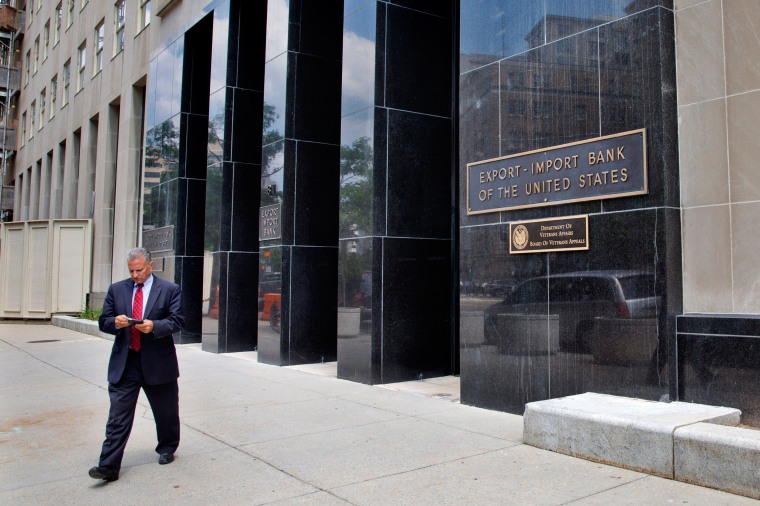A component of the ongoing fight over the Highway Trust Fund Bill is the reauthorization of the Export-Import Bank.
Opposing the independent federally backed bank has become a sort of conservative litmus test and an issue that divides the Republican Party.
Prior to this year, Congress routinely voted to keep the bank operating. In fact in 2012, the last reauthorization passed the GOP-led House 330-93.
Senate Majority Leader Mitch McConnell attached the reauthorization of the Export-Import bank as an amendment to a major highway funding bill which is due by July 31st. The Senate passed it on Monday 64-29, but conservatives in the House let the bank's charter expire on July 1st meaning that the bank has not been able to process new transactions.
Here's what you need to know:
WHAT IS THE EXPORT-IMPORT BANK AND WHAT DOES IT DO?
The 81 year old bank, created by executive order by former president Franklin D. Roosevelt during the New Deal era, primarily finances and insures foreign purchases of U.S. products. Known as the Ex-Im Bank , it’s a federally backed financial institution which makes and guarantees loans. The Ex-Im Bank also “offers insurance to American companies so they can do business overseas."
WHO BENEFITS FROM IT?
Supporters of the bank say that it's crucial for American companies, particularly small businesses. With loan guarantees, companies are willing to invest in new global markets and foreign companies are willing to buy the products. This in turn supports roughly 164,000 American jobs and helps grow the economy and tax base and is friendly to the taxpayer, according to the bank.
While small businesses do account for some of the loans doled out by the EX-IM Bank, opponents says 87% go to giant corporations like Boeing, General Electric and Caterpillar.
Thus, they argue, it's a program that is a form of corporate welfare.
IF THIS HAD BIPARTISAN SUPPORT FOR SO LONG, WHY IS IT AN ISSUE?
The modern opposition to EX-IM can be traced back to the Tea Party wave of 2010 and the rise of anti-government conservatism that has gripped Capitol Hill since. Many conservative Republicans see EX-IM as engaging in "crony capitalism," meaning that the government is picking winners and losers by deciding what companies get loans, are insured, etc.
It also coincides with the rise of strong outside conservative groups such as Heritage Action, Club For Growth, Americans for Prosperity and other organizations backed by the Koch Brothers.
Opponents of EX-IM have attracted some prominent and vocal supporters eager to tap into the Tea Party energy and to not upset the outside conservative groups. Republican presidential candidates Sen. Ted Cruz of Texas and former Florida Gov. Jeb Bush as well as House Majority Leader Kevin McCarthy, R-California, all oppose the bank.
On the left, some like Democratic presidential candidate Vermont Senator Bernie Sanders say that EX-IM subsidizes large corporate interests that turn around and ship jobs overseas. Sanders wants to eliminate EX-IM and send funds to small businesses only.
WHO SUPPORTS IT?
President Barack Obama as well as most Democrats who think the bank saves American jobs. So do pro-business Republicans who believe EX-IM puts the USA on equal footing with other foreign nations that insure and promote their products.
Not surprisingly, so do politicians who have a large group of constituents who work for General Electric, Boeing and Caterpillar.
WHAT'S GOING TO HAPPEN?
The Ex-IM Bank can only work on the loans and insurance previously agreed to. House Majority Leader Kevin McCarthy says there are no plans to vote on the reauthorization of the Export-Import Bank before the August recess and that the House will not agree to attach it to the must-pass highway bill.
IS THIS THE END FOR THE BANK?
Probably not. The vote in the Senate showed it has enough support to move forward if given a chance on the floor. It's all a balancing act of how the GOP Leadership wants to move it forward in a way where it can pass and cause them the least amount of headaches with the activist base.
